

SUBSCRIBE TO OUR FREE NEWSLETTER
Daily news & progressive opinion—funded by the people, not the corporations—delivered straight to your inbox.
5
#000000
#FFFFFF
To donate by check, phone, or other method, see our More Ways to Give page.


Daily news & progressive opinion—funded by the people, not the corporations—delivered straight to your inbox.
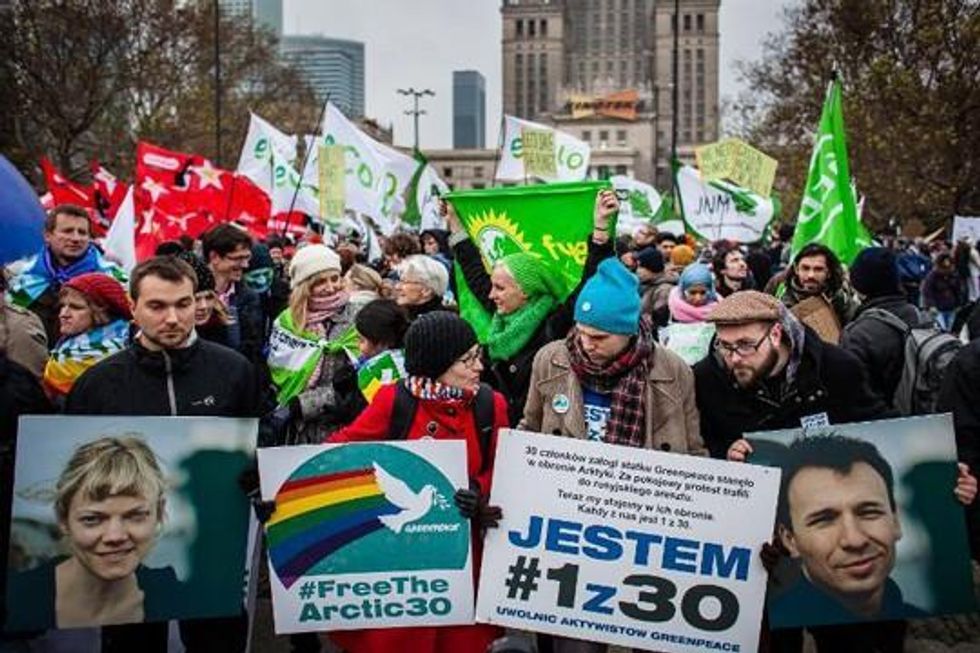
Protests are being held in 263 cities around the world Saturday to mark two months since Greenpeace's 'Arctic 30' were jailed in Russia for demonstrating against Arctic drilling.
In a case that has sparked an international outcry, the crew-members of Greenpeace's Arctic Sunrise ship were detained on September 18 after several of them scaled an oil platform run by Russian state-owned energy giant Gazprom.
Many of today's demonstrations will focus on the role of Gazprom and its Arctic oil business partner, Shell. It was the demands from Gazprom for the Russian authorities to intervene during the protest that ultimately led to the detention of the 30.
The international day of protests will include:
Greenpeace International campaigner Barbara Stoll explained:
"The Arctic 30 were arrested and imprisoned after Gazprom asked the authorities to intervene during our peaceful protest. Now the 30 remain behind bars and Gazprom could play a key role in securing their release so they can go home to their families. If Gazprom wanted the Arctic 30 to be free, it could wield significant influence by calling for their release."
She added:
"To break open the Russian Arctic, Gazprom needs its business partners at Shell. That puts Shell in a hugely powerful position to influence Gazprom. If Shell wanted to stand up for freedom of expression and to see the Arctic 30 released, the company could push its friends at Gazprom to make the call. But by staying silent, it's hard not to conclude that Shell is putting its Arctic oil deal ahead of the release of these prisoners of conscience."
* * *
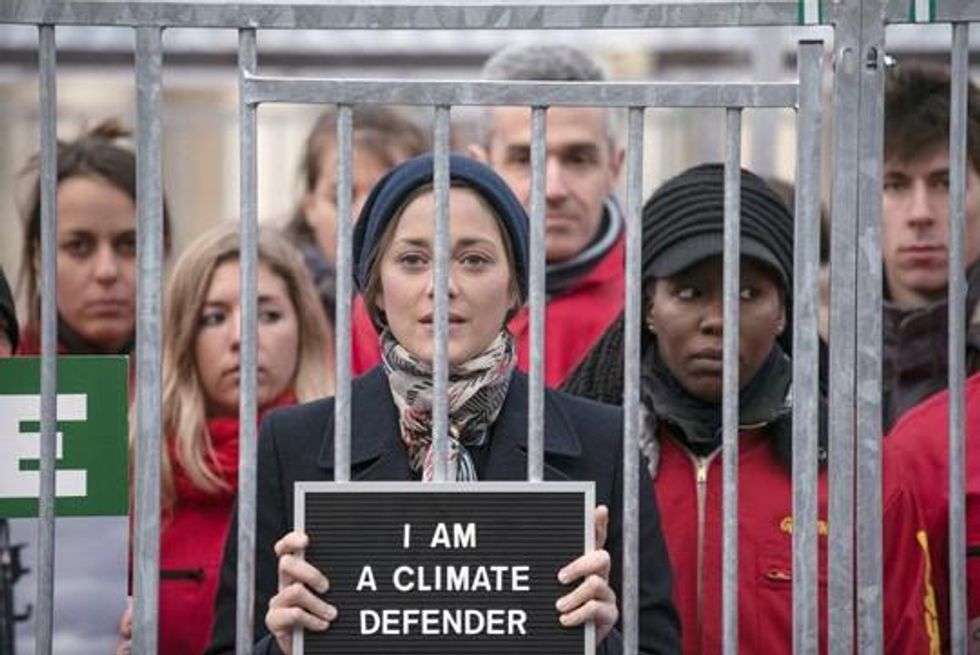
* * *
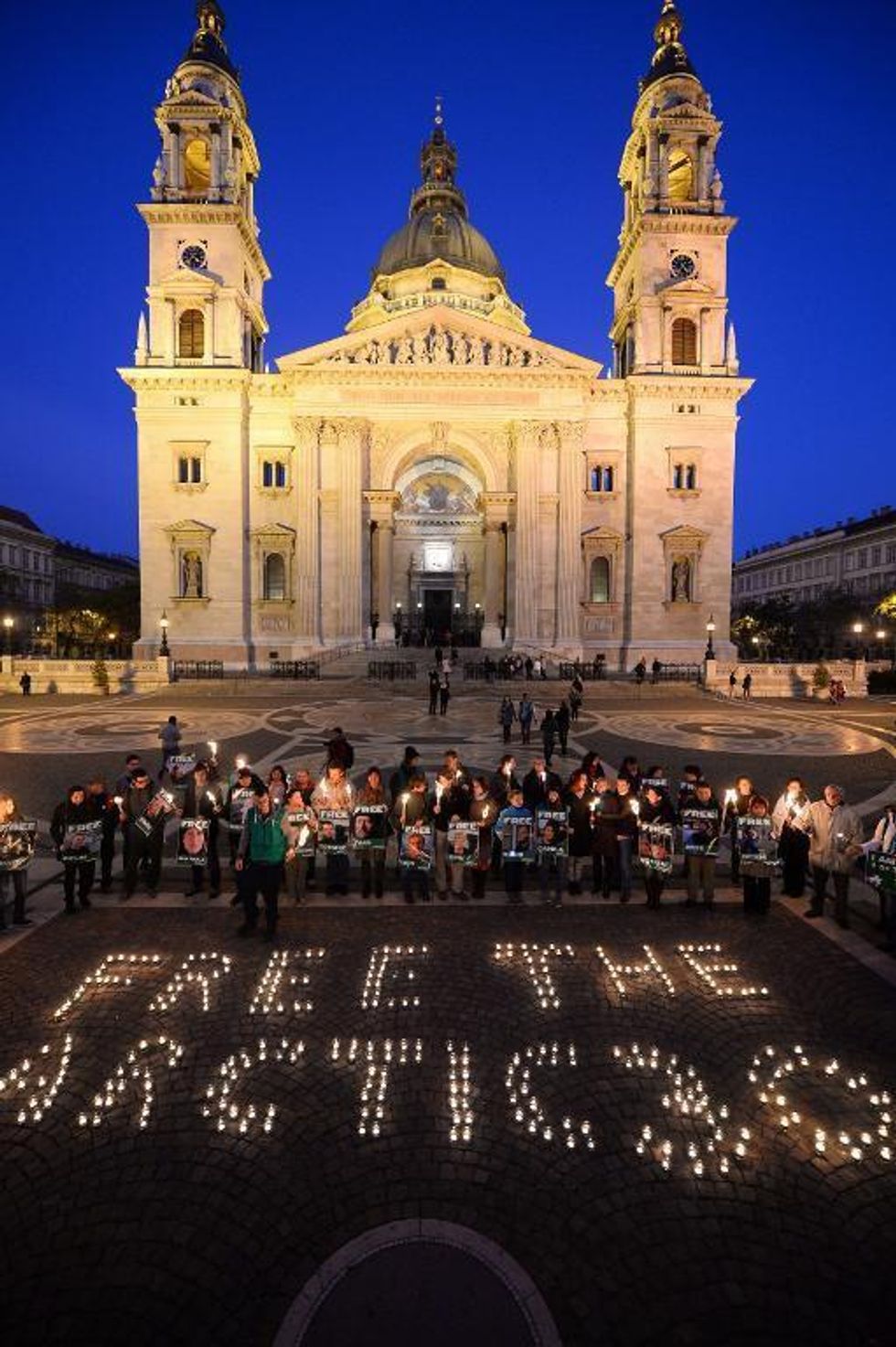
* * *
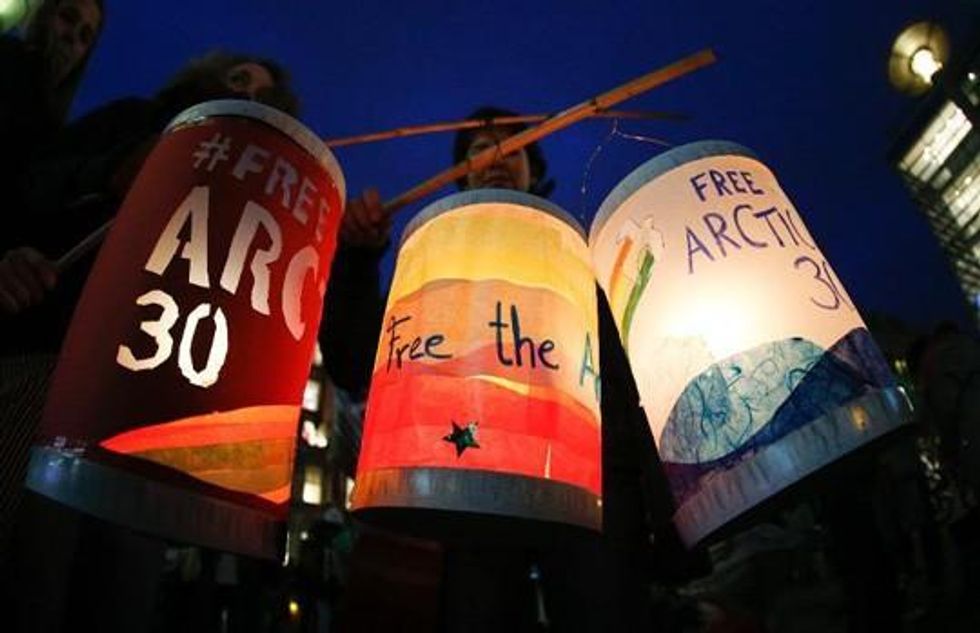
* * *
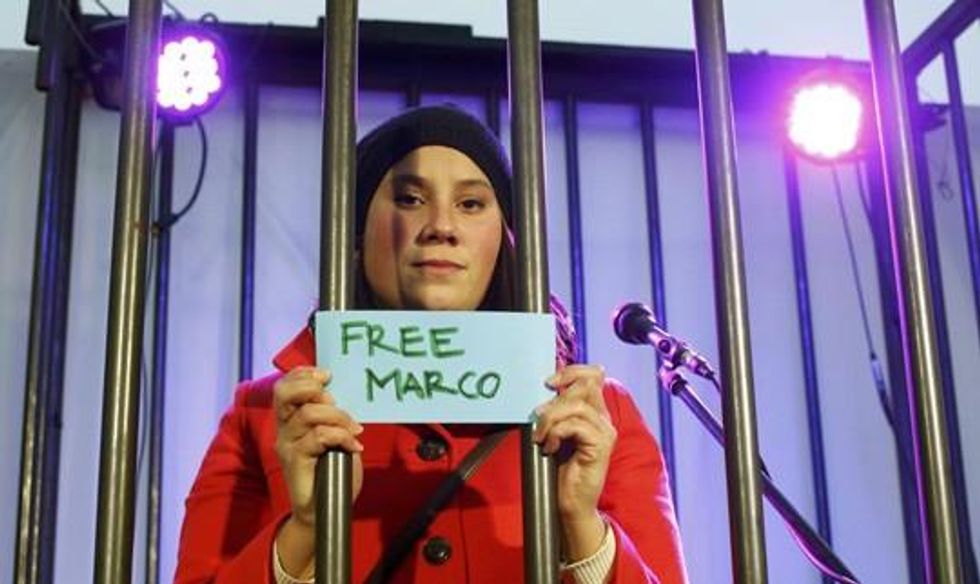
# # #
Dear Common Dreams reader, The U.S. is on a fast track to authoritarianism like nothing I've ever seen. Meanwhile, corporate news outlets are utterly capitulating to Trump, twisting their coverage to avoid drawing his ire while lining up to stuff cash in his pockets. That's why I believe that Common Dreams is doing the best and most consequential reporting that we've ever done. Our small but mighty team is a progressive reporting powerhouse, covering the news every day that the corporate media never will. Our mission has always been simple: To inform. To inspire. And to ignite change for the common good. Now here's the key piece that I want all our readers to understand: None of this would be possible without your financial support. That's not just some fundraising cliche. It's the absolute and literal truth. We don't accept corporate advertising and never will. We don't have a paywall because we don't think people should be blocked from critical news based on their ability to pay. Everything we do is funded by the donations of readers like you. Will you donate now to help power the nonprofit, independent reporting of Common Dreams? Thank you for being a vital member of our community. Together, we can keep independent journalism alive when it’s needed most. - Craig Brown, Co-founder |

Protests are being held in 263 cities around the world Saturday to mark two months since Greenpeace's 'Arctic 30' were jailed in Russia for demonstrating against Arctic drilling.
In a case that has sparked an international outcry, the crew-members of Greenpeace's Arctic Sunrise ship were detained on September 18 after several of them scaled an oil platform run by Russian state-owned energy giant Gazprom.
Many of today's demonstrations will focus on the role of Gazprom and its Arctic oil business partner, Shell. It was the demands from Gazprom for the Russian authorities to intervene during the protest that ultimately led to the detention of the 30.
The international day of protests will include:
Greenpeace International campaigner Barbara Stoll explained:
"The Arctic 30 were arrested and imprisoned after Gazprom asked the authorities to intervene during our peaceful protest. Now the 30 remain behind bars and Gazprom could play a key role in securing their release so they can go home to their families. If Gazprom wanted the Arctic 30 to be free, it could wield significant influence by calling for their release."
She added:
"To break open the Russian Arctic, Gazprom needs its business partners at Shell. That puts Shell in a hugely powerful position to influence Gazprom. If Shell wanted to stand up for freedom of expression and to see the Arctic 30 released, the company could push its friends at Gazprom to make the call. But by staying silent, it's hard not to conclude that Shell is putting its Arctic oil deal ahead of the release of these prisoners of conscience."
* * *

* * *

* * *

* * *

# # #

Protests are being held in 263 cities around the world Saturday to mark two months since Greenpeace's 'Arctic 30' were jailed in Russia for demonstrating against Arctic drilling.
In a case that has sparked an international outcry, the crew-members of Greenpeace's Arctic Sunrise ship were detained on September 18 after several of them scaled an oil platform run by Russian state-owned energy giant Gazprom.
Many of today's demonstrations will focus on the role of Gazprom and its Arctic oil business partner, Shell. It was the demands from Gazprom for the Russian authorities to intervene during the protest that ultimately led to the detention of the 30.
The international day of protests will include:
Greenpeace International campaigner Barbara Stoll explained:
"The Arctic 30 were arrested and imprisoned after Gazprom asked the authorities to intervene during our peaceful protest. Now the 30 remain behind bars and Gazprom could play a key role in securing their release so they can go home to their families. If Gazprom wanted the Arctic 30 to be free, it could wield significant influence by calling for their release."
She added:
"To break open the Russian Arctic, Gazprom needs its business partners at Shell. That puts Shell in a hugely powerful position to influence Gazprom. If Shell wanted to stand up for freedom of expression and to see the Arctic 30 released, the company could push its friends at Gazprom to make the call. But by staying silent, it's hard not to conclude that Shell is putting its Arctic oil deal ahead of the release of these prisoners of conscience."
* * *

* * *

* * *

* * *

# # #